Jun 1, 2020
A statistical look at the Penguins vs. Canadiens play-in series
Montreal gets a second chance at the postseason in a matchup against a Pittsburgh team that will finally be healthy, Travis Yost writes.
By Travis Yost
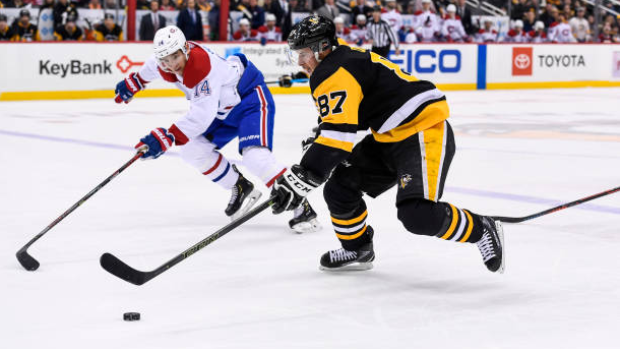
The National Hockey League’s redesigned playoff format is official, and assuming all goes to plan, we are about six weeks away from watching hockey once again.
The new format will feature 24 teams and begins with a 16-team qualifying round. The opening best-of-five series offers new life to eight teams that were below the original playoff cutline, and should create waves of excitement for eager sports fans.
Over the next few weeks, we will be previewing each qualifying round series in detail. An archive of previews can be found here:
(8) Toronto Maple Leafs vs. (9) Columbus Blue Jackets
Today, we look at a second Eastern Conference matchup, the No. 5 Pittsburgh Penguins against the No. 12 Montreal Canadiens.
Regular Season Performance
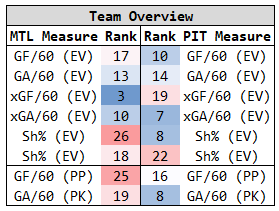
To say that the league’s 24-team playoff gives new life to the Montreal Canadiens would be an understatement. While most of the bubble teams that made the postseason under the new format were just a couple of wins back, the Canadiens were trailing by 10 points with less than one per cent playoff odds.
On the other side of the coin, no team was victimized more by the NHL’s decision to create a play-in round than the Pittsburgh Penguins. Pittsburgh carried 96 per cent playoff odds at the time the regular season was stopped, buoyed by an impressive +28 goal differential – seventh best in the league.
To say this year in Pittsburgh was atypical would also be an understatement. The Penguins were decimated by injuries all season long, with the most notable belonging to Sidney Crosby (sports hernia). But Crosby wasn’t the only player to miss time – just look at their scoring leaderboard relative to availability and you can see how much inconsistency there was throughout the lineup:
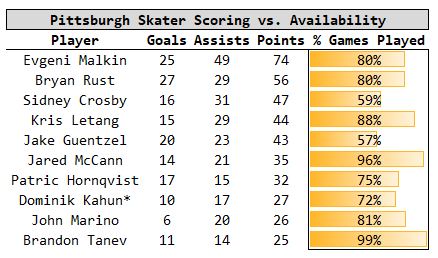
Pittsburgh, to that end, may be one of the teams that benefits most from a lengthy reset. All teams are getting the benefit of getting back to full health, but Pittsburgh’s true talent was likely disproportionately impacted by frequently fragmented lineups.
That’s particularly noteworthy when it comes to even-strength play, where the lion’s share of minutes will be played come playoff time.
Montreal’s one distinct core competency is their ability to play extensively in the offensive zone – no team carried better puck possession and shot generation rates than the Canadiens, who ran up big differentials all season long. And it wasn’t for naught: the Canadiens may have finished 24th in the standings, but they actually outscored their opponents 158 to 151 (+7) at even strength.
They may have been low on finishing talent and void of strong shooters in their top-six forwards, but you can manage through a lot when you are getting 55 per cent of the shot share (best in the NHL).
The issue here is that Montreal is running into an equally capable Pittsburgh team at even strength – a team capable of neutralizing their greatest strength. The Penguins outscored opponents 160 to 145 (+15) in this game state, seventh best in the league.
Skater Overview (Goals Above Replacement)
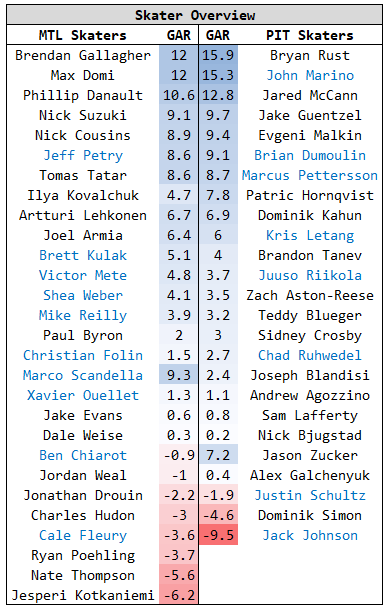
If you look close enough, that’s journeyman winger Bryan Rust leading the Penguins in Goals Above Replacement contributions.
It’s hard to say enough about Rust’s season – he scored 56 points (27 goals and 29 assists) in just 55 games, becoming one of the team’s most versatile weapons. Head coach Mike Sullivan’s decision to put him on the hip of superstar Evgeni Malkin – who had a ridiculous 74-point season (55 games played) in his own right – proved one of the best coaching decisions of the 2019-20 regular season. With Rust on the ice, the Penguins were 1.3 goals better than their opponents for every 60 minutes of play – a number directly comparable to stars like Colorado’s Nathan MacKinnon and Philadelphia’s Sean Couturier.
Separately, you will notice that Crosby – who has led the team in any counting or advanced metric since entering the league, more or less – fell quite a bit in the pecking order this season. Some of this is merely because of the missed time and recuperating from injury, and betting against a player of his calibre would be foolish. But it is certainly noteworthy that for the second time in three seasons, Crosby’s incredible skill set didn’t mean much when it came to driving goal differentials:
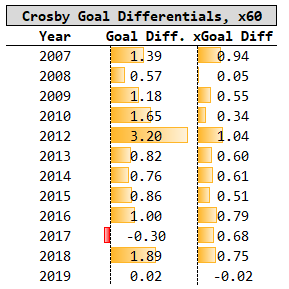
The good news for Pittsburgh is that, regardless of his weird regular season, Crosby remains one of the most gifted two-way players in the league. That will certainly pay dividends from a matchup standpoint, as he can be used to shadow the likes of Brendan Gallagher’s line.
Gallagher remains one of the league’s most underrated forwards and has shown effective at piercing the defensive interior against just about everyone, teaming up with Phillip Danault and Tomas Tatar to create a fantastic top line.
But this transitioning Canadiens team is still top-heavy, and if their first line can’t crack the Pittsburgh defence, it could end up being a very quick series.
Goalie Overview (Goals Saved Above Average)

The biggest X-Factor of the series is not particularly close – it’s Montreal goaltender Carey Price.
Price is considered by his peers as the best goaltender in the league, but the data suggests otherwise. Price’s save percentage (90.9) was below league average for the second time in three seasons, and adjustments for shot quality faced aren’t material. Over that three-year window, Price is 22nd of 24 goaltenders (minimum 5,000 shots faced) in goals saved above expectations at -32.2. The only goalies in trail, in fact, are Minnesota’s Devan Dubnyk and Ottawa’s Craig Anderson.
It wasn’t always like this. You likely remember the Price who won the Vezina Trophy back in 2015. For years, Price was posting strong save percentages and bailing out his defence. The opposite has been true of late:
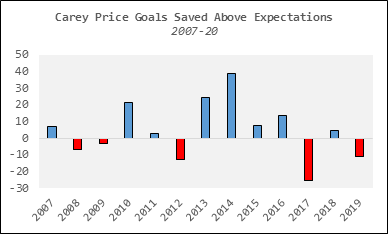
Price has been an outstanding goaltender for years, but the results are starting to lag behind the lore. If he can put together a short series where we see the Price of 2013-16, Montreal carries a decisive advantage in net against Tristan Jarry and the Penguins. If it’s more of the same, it’s at best a wash.
Oh, and that is me assuming Pittsburgh plays Jarry over Matt Murray. Considering their respective seasons, how could Sullivan choose differently?
Prediction
I would have loved to see Montreal – a dynamic puck-possession team that can occasionally skate teams out of rinks with their speed on the wings – draw anyone not named Pittsburgh. But their offensive limitations and inadequate special teams are a problem, and Pittsburgh is just too deep, too versatile, and finally healthy.
The pick is Pittsburgh in four.
Data via Natural Stat Trick, HockeyViz, Evolving Hockey, NHL.com

